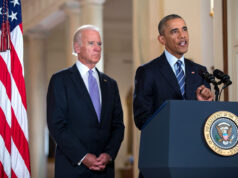For all the thunder about the “missing” J Street speech Chuck Hagel gave in 2009, watching it was almost a letdown.
There is simply no “smoking-gun” anti-Semitism or anti-Israelism there, aside from a single reference to some policies working to the “single issue benefit of certain groups.” OK, yes, that’s a reference to Jews, and no, it isn’t nice. But generally speaking, Hagel gave a truly boilerplate, mediocre speech that starts in the wrong place, makes factual errors, and then draws the wrong conclusions.
Sen. Hagel begins by explicitly calling the Palestinian-Israeli or Arab-Israel conflict (he incorrectly equates the two) the foundation of anti-Western Arab attitudes and the wellspring of Islamic jihad. He starts the conflict in 1967. Arab opposition to Jewish communal life in any part of Ottoman Palestine expressed itself in attacks on Jews long before Israel’s independence in 1948, and it continued after with the Arab rejection of the State of Israel, even as Jordan and Egypt illegally occupied the West Bank and Gaza from 1949-67. To ignore this erases the responsibility of the Arab States for a) their continuing intransigence on the subject of Israeli sovereignty and b) their failure to establish a Palestinian Arab state in 1948. The Arab States don’t mind.
What Words Mean
Turning to Palestinians and Israelis, Sen. Hagel says, “Both sides know what the issues are” and that those issues have been “holding us hostage since 1967.” The issues, according to Hagel, are borders, refugees, and Jerusalem, which is like saying “War and Peace” is about war and peace.
For a single example of the pitfalls of broad generalizations, consider “refugees.” Israel and the United States agree that hundreds of thousands of Jews evicted from Arab countries after 1948 constitute a refugee group entitled to compensation. The Arab States do not agree, because it would make them culpable. (See 1948, above.)
The Palestinians define refugees inter-generationally — a position unique in refugee relief circles. It is the formal Palestinian position that the original 1947/48 refugees and their descendants have a right to live within the 1948 borders of Israel, even if they choose to accept compensation or settlement elsewhere; that’s why they call it the “right of return.” Palestinian officials are on record asserting that even the establishment of an independent Palestinian State will not make Palestinian citizens out of refugees who should be “returned” to Israel. The United States and Israel do not agree.
There are similar issues regarding Palestinian use and Israeli use of the words “borders” and “Jerusalem.” Even if you really do know “what the issues are,” you might discover that they are not resolvable.
Smaller Problems and Bigger Ones
Sen. Hagel ascribes the inability of Palestinians and Israelis to achieve “peace” to leaders “in Ramallah, in Tel Aviv, in Riyadh, and in Cairo” unwilling to undertake the “difficult and harsh responsibilities of leadership.” The smaller problem is his placement of the Israeli Prime Minister in Tel Aviv. The bigger one is conflating Arab dictatorships with Israel’s democratic leadership, which is subject not only to elections, but also to a free press and independent judiciary. By the time of Hagel’s speech, PA leader Mahmoud Abbas had already finished his elected term and to this day has not faced voters again.
Trying to be practical, Sen. Hagel suggested discussing “security guarantees for Israel” at the “front end” of the process, presumably to give Israel confidence that its withdrawal from strategic territory would not increase its risk. He proposed foreign forces to replace the IDF, something Israel has generally rejected. That is the smaller problem.
The bigger one is his apparent willingness to use American troops.
The biggest is that his model for West Bank peacekeeping is the Multinational Force and Observers (MFO) in the Sinai. The correct model would be the U.N. Interim Force in Lebanon (UNIFIL) because the problems will be the same ones UNIFIL faces.
The mission of the MFO is to monitor compliance with Sinai demilitarization. Egypt withdrew its forces to an agreed-upon line, and there were few civilians living near the border (this has changed over the decades with a corresponding increase in smuggling and terrorist activity). On the Israeli side, the Negev is not densely populated and is far from the major cities.
In any West Bank arrangement, the populations will be physically close, and tens of thousands of Palestinians work in Israel every day. After Israel withdrew behind the U.N.-approved international border with Lebanon, Hezb’allah moved right up to the border with its missiles. UNIFIL soldiers live in Lebanon among the villagers, and Hezb’allah lives among them as well. UNIFIL, then, is hostage to Hezb’allah. In three meetings with UNIFIL representatives in which I participated, the ability to live unmolested was of understandably great importance to the international forces, which have not discovered a single Hezb’allah breach of the U.N. ceasefire since 2006.
These, though, are problems for Israel and its neighbors to solve, or not.
America’s Problem in the Region
During the Q&A, the moderator said to Sen. Hagel, “So Iran is connected to Afghanistan, and Afghanistan is connected to Israel and Palestine, and connected to Syria.” Hagel replied, “It’s all connected.”
But not to Israel. If it were, one might almost understand Hagel’s and J Street’s determination to sacrifice Israel on the altar of “world peace” or a tolerant Islam or the end of Islamist jihad against the West and the end of terrorism as a decent trade-off — like tossing virgins into the volcano.
If Sen. Hagel wants to be an effective secretary of defense in a successful administration, he and they have to grapple with what Secretary Clinton finally called the “global jihad.” That, not America’s failure to “solve” the Palestinian-Israeli conflict, is the core of America’s problem with radical Islamists.
There is a stream of radical, anti-Western Islam that has taken hold across the Middle East and now North Africa: the Sunni version come from the Muslim Brotherhood and al-Qaeda, and the Shiite version from Iran. They don’t like Israel. They also don’t like the United States or Europe; they don’t like modernity, women, gays, education, science, capitalism, free markets, or tolerance. If Israel disappeared, all the other things they hate would remain, and they themselves would remain, and they would be our problem still. Israel isn’t the problem; it is an ally in the fight.
Sen. Hagel didn’t understand that in 2009. But that was when Mubarak was still in power and 60,000 now-dead Syrians were still alive. Before Tunisia, Libya, Mali, Nigeria, and Algeria. The question for the Senate is, “Does he understand it now?”





